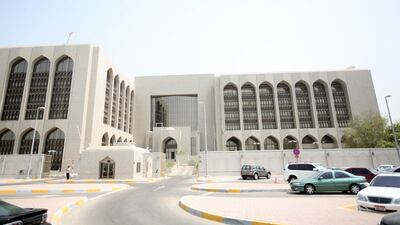The UAE economy will expand 2.1 per cent this year, driven by pandemic-mitigation measures that boosted recovery from the coronavirus-driven slowdown, latest data from the Central Bank of the UAE has shown.
While the growth estimate for this year is slightly lower than the 2.4 per cent projected in June, the Arab world’s second-largest economy is set grow at the much faster rate of 4.2 per cent in 2022, higher than an earlier 3.8 per cent forecast, the banking regulator said in its second quarter review.
“Economic activity in the UAE continued its recovery in the second quarter, with estimated Q2 growth reaching close to the pre-pandemic level,” the central bank said.
The faster pace of growth anticipated next year is the “result of the continued increase in public spending, banks’ credit outlook, higher employment and better business sentiment, as Dubai World Expo will continue to take place in Q1 2022”.
“Being a major tourism, transit and trade hub in the region, the UAE is also expected to benefit from the opening of travel restrictions and events such the Fifa World Cup.”
The central bank maintained its real non-oil growth – adjusted for inflation – at 3.8 per cent for 2021. It is expected to improve slightly to 3.9 per cent next year.
“The non-oil sector continued to improve in Q2 2021, benefitting from the recovery in global travel and pick up in local and global demand, while the country continued to be a leader in containing the spread of the virus,” the central bank said.
The UAE’s oil economy is projected to slow to 2 per cent in 2021, a main reason for the central bank's overall GDP growth forecast revision for 2021, it said.
However, the oil economy is expected to bounce back, accelerating 5 per cent in 2022, compared with an earlier 3.5 per cent estimate in June. This reflects “the expected increase in demand with majority of the world economies being vaccinated”, the bank said.
The UAE economy, which contracted 6.1 per cent in 2020 on the back of the global economic slowdown, has bounced back strongly, boosted by pandemic-mitigation measures and fiscal and monetary support from the government.
The Emirates has introduced economic stimulus worth Dh388 billion ($105.72bn) since the pandemic tipped the world economy into its worst recession since the 1930s. These packages include the central bank's Dh50bn Targeted Economic Support Scheme (Tess) to boost liquidity in the financial and banking sector, parts of which have been extended to June 2022.
A rapid, mass Covid-19 vaccination programme and widespread testing in the UAE has also boosted economic activity. More than 80 per cent of the UAE population is now fully vaccinated, while about 91 per cent of the people in the country have received one dose, government data last week showed.
“The UAE kept its top position globally since the beginning of the pandemic in the number of tests and in the distribution of the vaccine per capita,” the central bank said.
The real estate sector, a key component of the country’s economy, has also showed signs of recovery in the second quarter, with “residential real estate prices marking a second quarter of significant year-on-year increase in Abu Dhabi”, the bank said.
The average UAE PMI also increased by 11.3 per cent year-on-year in the second quarter of this year, “moving further up in the expansion zone”.
“The improvement reflects the better sentiment,” the central bank said.


